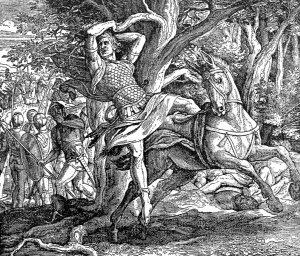 David fell into temptation and sinned against God. He took Bethsabee the wife of Urias, and afterwards plotted the death of her husband.
David fell into temptation and sinned against God. He took Bethsabee the wife of Urias, and afterwards plotted the death of her husband. David fell into temptation and sinned against God. He took Bethsabee the wife of Urias, and afterwards plotted the death of her husband.
David fell into temptation and sinned against God. He took Bethsabee the wife of Urias, and afterwards plotted the death of her husband.
Greatly offended, God sent the prophet Nathan to rebuke David. The king humbly acknowledged his fault, saying have sinned against the Lord." Because of this humble confession, God pardoned David. But as punishment for his sins, David was sent many trials.
David's greatest trial was the revolt of his son Absalom. Absalom plotted against his father, beginning by flattering the people. When he thought he had enough supporters, he openly declared war. So many flocked to aid Absalom that David and his followers had to leave Jerusalem.
Weeping and walking barefoot, David went over the brook Cedron, up Mount Olivet, and across the Jordan. A man named Semei met him, and threw stones at him and cursed him, calling him a man of blood.
One of David's servants wanted to kill Semei, but David said, "Let him alone and do not trouble him. Perhaps the Lord will see my sorrow, and turn his curses into blessings."
Absalom pursued his father beyond the Jordan. Their armies met, and a battle was fought in the forest.
Absalom's army was defeated, and he fled on his mule. As the animal ran under an oak tree, Absalom's long hair was caught in the branches. While he hung there, the mule ran away. One of David's generals went and thrust three spears into Absalom's heart, and so the ungrateful son died.
The horrible fate of Absalom is a lesson to all children, teaching them to obey and honor their parents, as God commands.
When David heard of Absalom's death, he was filled with sorrow. He cried out, "My son Absalom, Absalom my son! Would to God that I might die for thee, Absalom my son, my son Absalom!"
In his sorrow for his son, David was a figure of Christ weeping, praying, and dying for His rebellious people, even for them that crucified Him.
- from My Bible History in Pictures, by Bishop Louis LaRavoire Morrow, D.D., 1934; it has the Imprimatur of Archbishop Michael J O'Doherty of Manila, Philippines